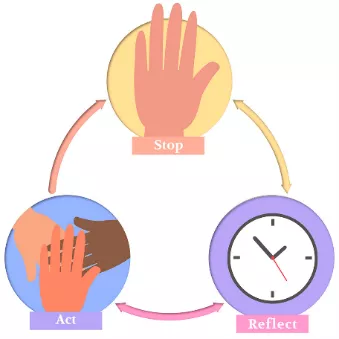Trusting and supportive teams for educator wellbeing
- Home
- Latest news
- We hear you
- Trusting and supportive teams for educator wellbeing

Be You commissioned Monash University to conduct 5 projects investigating educator wellbeing. The study found that relationships with colleagues play an integral role in an educator’s fulfilment at work. Educator wellbeing is strengthened when the workplace culture nurtures these relationships. Conversely, strained or fractured relationships can have a profoundly negative impact on educator wellbeing. Early learning services can address this by creating a culture that is respectful, inclusive and collaborative.
The outcomes below are what positive practice looks like for ‘working together’ in a workplace. Consider what focus areas you may like to address in your learning community. How does this look in your context?
Collegial relationships
- Respectful communication where individual views and ideas are welcomed
- Opportunities for respectful team planning and working together
- Open communication and active listening
- Educators work well together, care for each other and can rely on each other
- Environments (for example, staffrooms) promote healthy, inclusive relationships and a sense of belonging
- Timely and responsive procedures to address overt or casual discrimination and unhealthy communication styles
- Conflict resolution skills for educators
Workplace culture
- The successes and achievements of individual educators and teams are recognised and celebrated
- Personal and professional boundaries are respected and upheld
- Staff have opportunities to provide input, feedback and collaborate in the decisions impacting the learning community
You don’t have to take action in any particular order or cover all the areas listed. Choose what will work best for your workplace and have ongoing conversations with your team.
Open and respectful communication
A key area of positive practice is open and respectful communication. Honest and respectful communication builds trust. In turn, this allows people to be open about their thoughts and feelings. Sometimes these conversations can be difficult to have, which can impact our wellbeing. However, we can all be prepared for a conversation. You can start with the simple Stop Reflect Act framework:
STOP
The first step is to stop what you are doing so you can:
- focus on the current situation
- pause and listen before responding
- be mindful of what is being communicated.
Stopping to pause and listen helps people feel heard. It also allows you to gather useful information about how someone is coping and gives you the chance to check in with yourself.
REFLECT
The second step is to take time to reflect. Reflecting allows you to tailor the appropriate support while considering the scope of your role and personal wellbeing.
You might consider:
- Is it an appropriate time and place to talk?
- Do you feel prepared to have the conversation?
- Do you need more information?
- Are there service policies and procedures to support you?
- Can you answer the question, or do you need to help?
- How might this impact wellbeing?
- What support is within my role?
- What external support options can I provide?
Take time to reflect on:
- family background
- context
- available skills, knowledge and experience of you and your colleagues
- your boundaries in this situation.
Dr Rebecca Ray explains boundaries as your personal instruction manual for how to respect and care for you. She states that boundaries take away the guesswork for everyone you interact with, acting as ‘circles of empowerment and self-preservation’.
Boundaries are your best friend because they protect your personal and professional resources.
Dr Rebecca Ray
ACT
Acting addresses the conversation after considering your reflections. Your actions will be unique to the situation but may include
- acknowledging feelings and experiences
- offering support
- promoting help-seeking
- encouraging self-care.
You don’t need to have all the answers or solutions immediately or on your own. Additionally, it’s important to always follow through and follow up.
Further Be You resources
Beyond Self-Care: An Educator Wellbeing Guide